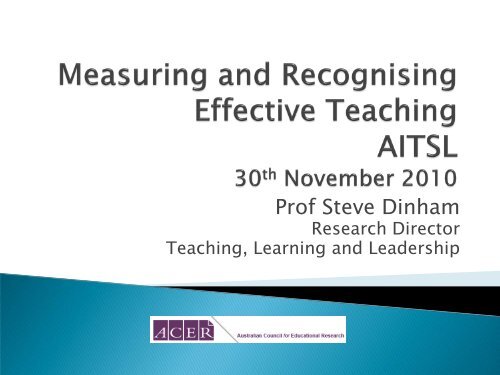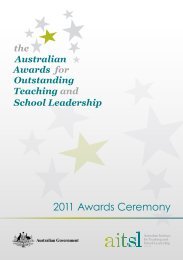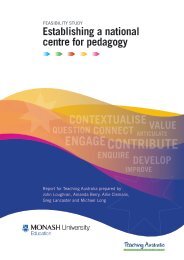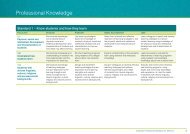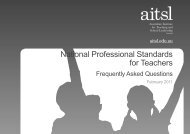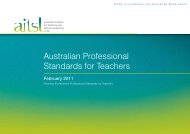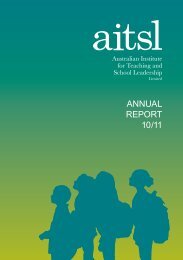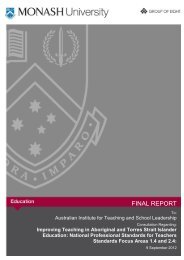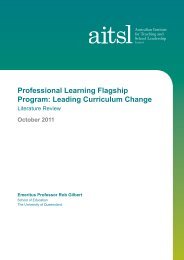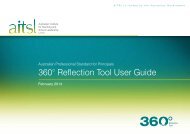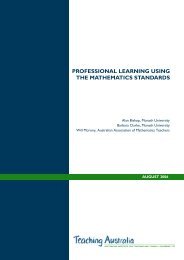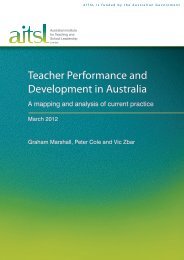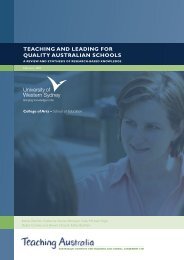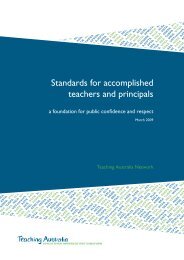Prof Steve Dinham - Australian Institute for Teaching and School ...
Prof Steve Dinham - Australian Institute for Teaching and School ...
Prof Steve Dinham - Australian Institute for Teaching and School ...
Create successful ePaper yourself
Turn your PDF publications into a flip-book with our unique Google optimized e-Paper software.
Examples of ‘active teaching’ (reciprocal teaching;feedback; teaching self-verbalisation; metacognitionstrategies; direct instruction; masterylearning; testing) have large to moderate effects onstudent achievement. Effect sizes are negligible or small <strong>for</strong> ‘facilitoryteaching’ (simulations <strong>and</strong> games; inquiry-basedteaching; individualised instruction; problembasedlearning; differentiated teaching <strong>for</strong> boys<strong>and</strong> girls; web-based learning; whole languagereading; inductive teaching). Strategies to promote <strong>and</strong> remediate literacy figureprominently. Literacy is the foundation of studentachievement.7
SES <strong>and</strong> family background do have moderate/largeeffect sizes SES is about:◦ Foundations/advantage◦ Opportunity◦ Support◦ Role models <strong>and</strong> encouragement SES is not about:◦ Innate ability◦ Social-biological determinism◦ Potential8
ReadingScore800PISA 2000PISA (Australia)700600500400300200-2.5 -2.0 -1.5 -1.0 -0.5 0.0 0.5 1.0 1.5 2.0 2.5SES10
“ … school improvement by itself has potential tomake an enormous difference in the lives ofchildren even if broader social change is slow incoming. The children who depend most on goodschooling <strong>for</strong> academic growth are the least likelyto receive it. If school improvement begins early inlife <strong>and</strong> if sustained, the most disadvantagedchildren st<strong>and</strong> to benefit most. This reasoningsuggests that increasing the amount <strong>and</strong> thequality of schooling to which these children haveaccess would reduce inequality in academicachievement.”12
“<strong>Teaching</strong> is more complex than setting tests <strong>and</strong>assignments, marking books, <strong>and</strong> telling students whatto do. It is dem<strong>and</strong>ing, complex, dynamic <strong>and</strong> highlydependent on personal relationships <strong>and</strong> professionaljudgement. <strong>Teaching</strong> takes time to master <strong>and</strong> teacherpre-service education can only provide a foundation <strong>for</strong>the myriad of contexts <strong>and</strong> challenges to which teacherscan be exposed. … no two days are the same <strong>and</strong> thereis no certainty of what will eventuate in the next lessonor what one is likely to encounter around the nextcorner of the school.”◦ <strong>Dinham</strong>, S. (2006). ‘<strong>Teaching</strong> <strong>and</strong> Teacher Education: SomeObservations, Reflections <strong>and</strong> Possible Solutions’, ED Ventures, 2,pp. 3-20.14
Experts notice features <strong>and</strong> meaningfulpatterns of in<strong>for</strong>mation that are not noticedby novices. Experts have acquired a great deal ofcontent knowledge that is organised inways that reflect a deep underst<strong>and</strong>ing oftheir subject matter. Experts’ knowledge cannot be reduced tosets of isolated facts or propositions but,instead, reflects contexts of applicability. Experts are able to flexibly retrieveimportant aspects of their knowledge withlittle attentional ef<strong>for</strong>t.15
May appear ‘arational’, intuitive, nonanalytic Underst<strong>and</strong> <strong>and</strong> solve problems at a deeperlevel ‘Know’ their students; students ‘know’ them Though experts know their disciplinesthoroughly, this does not guarantee thatthey are able to teach others. Both teacher <strong>and</strong> students have highexpectations Experience gained over time important Expert teachers can’t (easily) articulate theirpractice16
Teachers genuinely expert in theirsubject area(s), <strong>and</strong> enjoyed teaching Three sorts of knowledge essential:◦ Subject content knowledge (what subjectcontent to teach)◦ Subject pedagogic knowledge (how to teachparticular subject content)◦ Subject course knowledge (subjectcurriculum, assessment, exam knowledge)17
Lessons were student centred <strong>and</strong> teacherdirected. Teachers were highly responsive tostudents <strong>and</strong> highly dem<strong>and</strong>ing, i.e.authoritative, rather than uninvolved,permissive or authoritarian. Mutual respect, confidence <strong>and</strong> highexpectations. The faculty was more significant thanexpected.18
Although wide range of strategies used, keycommon factor was emphasis on havingstudents think, solve problems <strong>and</strong> applyknowledge. Underst<strong>and</strong>ing built in layers, connections. Frequent assessment <strong>and</strong> feedback. Teachers saw their role as challengingstudents beyond dem<strong>and</strong>s of the HSC.19
Assisted note building, ownership of notemaking Group work, community learning morecommon than might be expected Good relationships <strong>and</strong> positive classroomclimate essential20
Faculty-based professional learning; Sharing programs, resources, teaching ideas; Setting high expectations <strong>and</strong> creating a facultyclimate <strong>for</strong> all members; Whole-faculty approaches, consistency <strong>and</strong> jointinitiatives; Developing a faculty identity within the school; Faculty HSC success breeding success throughattracting talented students, becoming a dominantculture within the school, <strong>and</strong> Setting up success in Years 7-10 through teachingthe ‘basics’ well <strong>and</strong> enthusing students about thesubject(s) taught by the faculty.21
QUALITYTEACHINGFOCUS ON THESTUDENT(Learner, Person)LEADERSHIPPROFESSIONALLEARNING22
Overall, the quality of the teacher <strong>and</strong> the quality ofteaching (large effect sizes) are much moreimportant than structural or working conditions(negligible or small effect sizes), demonstrating thefutility <strong>and</strong> waste of ‘fiddling around the edges’ ofschooling without sufficiently addressing thequality of teachers <strong>and</strong> the quality of teachingwithin schools <strong>and</strong> classrooms. Quality teaching matters <strong>and</strong> it’s time we startedacting like it. Recognising <strong>and</strong> rewarding teachers needs toreflect the realities of teaching.23


